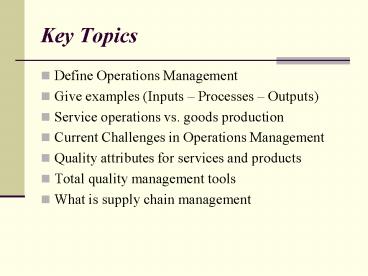Key Topics - PowerPoint PPT Presentation
Title:
Key Topics
Description:
Quality attributes for services and products. Total quality ... Ben and Jerry's Ice Cream. 100. 80. 60. 40. 20. Millions of Workers. Services. Goods Production ... – PowerPoint PPT presentation
Number of Views:21
Avg rating:3.0/5.0
Title: Key Topics
1
Key Topics
- Define Operations Management
- Give examples (Inputs Processes Outputs)
- Service operations vs. goods production
- Current Challenges in Operations Management
- Quality attributes for services and products
- Total quality management tools
- What is supply chain management
2
The Big Picture!
Marketing
Sales Management
Demand Forecasting
Facility Design
Advertising
Distribution
Product Management
Process Choice
Quality
Market Research
Operations Management
Business Strategy
Capacity
Customer Satisfaction
JIT
Finance
Planning Control
Leadership
Risk Management
Inventory Management
Motivation
Investment Analysis
Technology Management
Product Design
Product Pricing
Systems
Cash Flow
Group Dynamics/Teams
Valuation
Networking Telecommunications
Organizational Effectiveness
Product Costing
Budgeting
Information Systems
Accounting
Organizational Behavior
3
Operations Management
- Production creation of goods and services
- Operations management (OM) is defined as the
design, operation, and improvement of the systems
that create (transform inputs into outputs) and
deliver the firms primary products and services - Each part of the organization, not just
operations, must design and operate processes and
deal with quality, technology and staffing issues
4
Processes and Operations
Internal and external customers
- Inputs
- Workers
- Managers
- Equipment
- Facilities
- Materials
- Services
- Land
- Energy
- Outputs
- Services
- Goods
Information on performance
5
Small Group Activity
- Identify the inputs, processes, and outputs for
- Saint Michaels College
- Fletcher Allen Hospital
- Ben and Jerrys Ice Cream
6
Growth in the Goods and Services Sectors
7
Options for Increasing Contribution
Marketing
Finance
OM Option
Option
Accounting
Option
Current
Sales
Finance
Production
Revenue
Costs
-
50
Costs
-
20
50
Sales
100,000
150,000
100,000
100,000
Cost of Goods Sold
-
80,000
-
120,000
-
80,000
-
64,000
Gross Margin
20,000
3
0,000
20,000
36,000
Finance Costs
-
6,000
-
6,000
-
3,000
-
6,000
Net Margin
14,000
24,000
17,000
30,000
Taxes _at_ 25
-
3,500
-
6,000
-
4,250
-
7,500
Contribution
10,500
18,000
12,750
22,500
8
Significant Events in Operations Management
9
Continuum of Characteristics
More like a manufacturing organization
More like a service organization
- Physical, durable product
- Output that can be inventoried
- Low customer contact
- Long response time
- Regional, national, or international markets
- Large facilities
- Capital intensive
- Quality easily measured
- Intangible, perishable product
- Output that cannot be inventoried
- High customer contact
- Short response time
- Local markets
- Small facilities
- Labor intensive
- Quality not easily measured
10
New Challenges in OM
From
To
- Global focus
- Just-in-time
- Supply chain partnering
- Rapid product development, alliances
- Mass customization
- Empowered employees, teams
- Local or national focus
- Batch shipments
- Low bid purchasing
- Lengthy product development
- Standard products
- Job specialization
11
Competitive Priorities
- Cost 1. Low-cost operations
- Quality 2. High-performance design
- 3. Consistent quality
- Time 4. Fast, Reliable delivery
- 5. On-time delivery
- 6. New development speed
- Flexibility 7. Customization
- 8. Volume flexibility
Operating system capabilities and strengths
required to serve customers and outperform
competitors
12
Southwest Airlines Low Cost Competitive Advantage
13
Small Group Activity
- What makes a quality good?
- What makes a quality service?
14
Dimensions of Quality for Goods
- Operation
- Reliability durability
- Conformance
- Serviceability
- Appearance
- Perceived quality
Quality
15
Service Quality Attributes
Under-standing
16
Seven Tools for TQM
17
Supply-Chain Management
Supply Chain Management is primarily concerned
with the efficient integration of suppliers,
factories, warehouses and stores so that
merchandise is produced and distributed in the
right quantities, to the right locations and at
the right time, and so as to minimize total
system cost subject to satisfying service
requirements. SCM, is a strategic weapon that
seeks to synchronize a firms functions and those
of its suppliers to match the flow of materials,
services, and information with customer demand
18
Integrated Supply Chain








![READ [PDF] Historian's Handbook: A Key to the Study and Writing of His PowerPoint PPT Presentation](https://s3.amazonaws.com/images.powershow.com/10123106.th0.jpg?_=20240907125)



















![[PDF] Statistical Topics in Health Economics and Outcomes Research (Chapman & Hall/CRC Biostatistics Series) 1st Edition, Kindle Edition Full PowerPoint PPT Presentation](https://s3.amazonaws.com/images.powershow.com/10100154.th0.jpg?_=20240816062)


